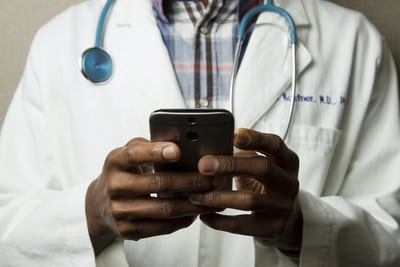
NCDHS: Telehealth a Long-Distance Win for Prisons, Providers
Raleigh -- North Carolina Department of Public Safety: Friday, June 19, 2020 - 9:35am
Prior to the coronavirus pandemic, offenders in North Carolina prisons who needed specialty visits to outside medical centers
for treatment of physical ailments could spend an entire day traveling across the state to the University of North Carolina at Chapel Hill, transported by correctional officers. That could provide security challenges depending on the facility’s vacancy rate. During this pandemic, transportation outside of a facility also brings the potential for COVID-19 infection.
During this pandemic, medical professionals have done all they can to prevent the spread of the coronavirus by using technology to replace “in-patient” visits. Any way they can conduct patient appointments and diagnose issues without meeting face-to-face is taking place whenever possible.
State prisons have also looked at this “telehealth” technology for several years and have used it for telepsychiatry appointments for mental health patients. Session Law 2019-135, enacted last year by the General Assembly, directed that the Prison system and UNC would conduct telehealth visits as a way to contain offender medical costs.
“We want timely care for offenders and keep our correctional officers in the facility,” said Prisons’ Director of Healthcare Administration Terri Catlett.
The pilot telehealth project was sped up due to the pandemic. Hospitals and doctors didn’t want the potential spread of COVID-19 coming to and from a prison, but the process to work the DX80 hand-held monitors and other technology from the state’s correctional facilities to Chapel Hill wasn’t as simple as flipping a switch and linking up technology. Prisons needed a waiver from state Department of Information Technology to allow UNC doctors security access through the state’s firewalls; doctors were needed to participate and training was necessary across the state.
“Pre-COVID pandemic, telehealth was not commonly used due to limited reimbursement and cumbersome regulations,” said Dr. Spencer Dorn, a gastroenterologist and vice-chairman of the UNC Department of Medicine, who has worked with Catlett and Prisons on the telehealth project. “In response to the pandemic, the Department of Medicine quickly pivoted to telehealth to protect our patients and staff, while preserving care access.”
A pilot took place with the enthusiastic support of Commissioner of Prisons Todd Ishee. Telehealth services for offenders included infectious diseases, orthopedics, cardiology and hepatology. Offenders remain in their facilities while facility health personnel use a hand-held telehealth scope to scan and provide information to a doctor on the other side of a computer screen. The doctor analyzes the information and provides a diagnosis.
At the start of June, specialty clinics participating in the Prisons telehealth project at UNC included ENT, orthopedics, cardiology, general surgery, infectious diseases, hepatology, dermatology, nephrology, urology, gastroenterology, endocrinology, gynecology and oncology.
“We needed technology on both ends for this to work,” said Catlett, who has spent countless hours on the project, including hands-on staff training. “Our IT team installed the DX80s in all our facilities. This is a two-fold initiative: Improved medical care and keeping our correctional officers in facilities facility managing offenders. All of our outpatient psychiatry has been done this way. We’ve had up to 40,000 (telehealth) encounters a year. We could not do mental health properly without this.
“We’ve spent a lot of time doing one-on-one training with our nursing staff. This wouldn’t work if staff is not comfortable with the equipment. This has been part of my vision for several years. To see this come to fruition is rewarding.”
Ishee said as telehealth continues, offender health care will expand.
“This will be a game changer for us in so many ways,” said Ishee. “We will be able to provide top-notch medical attention with an expanded number of health care providers who can provide care without having to step foot in a prison. Also, this will save money and improve safety in our prisons. More staff will be available for security duties instead of having to transport offenders to and from offsite medical appointments. This is a win-win-win: Better service, improved security and saving money.”
Dr. Dorn is also looking forward to the future of telehealth between UNC and the prison system.
“This is a rare opportunity in healthcare to improve value for everyone – patients, clinicians, UNC and DPS,” he said. “Although change is hard and there will be bumps along the way, the DPS telemedicine program will ultimately be a big win for all. DPS Healthcare staff have done a great job organizing this and we look forward to our ongoing partnership.”
Author:
Jerry Higgins, Communications Officer


 How to resolve AdBlock issue?
How to resolve AdBlock issue? 